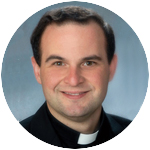
Father Eric J. Banecker
I ventured to a local hospital recently to visit a parishioner who was very sick. I walked up to the registration desk where the man at the counter politely greeted me, recognized that I was a priest there for a sick call, and then asked who I was going to see.
Because of COVID-19 restrictions, he had to call up to the nurse’s station to let them know that someone was coming up. The woman who answered said that visiting hours weren’t until later in the day (I know this because the call was on speaker). The man politely explained to his colleague that it was a priest here to visit the dying patient at the request of the family. The woman at the nurse’s station responded to that by informing him that it was not yet time for visiting hours.
[hotblock]
The man at the registrar desk seemed flustered, even shocked. I’m not sure if he was Catholic or not, but he was certainly apologetic when he hung up the phone. He sounded as if he had never heard of a priest not being allowed to see a patient.
I played it off as best I could, thanked the gentleman, and told him I’d return during visiting hours, which in fact I did.
That brief interaction left an imprint on me. My role in it was quite minor: a hospital call, the minor inconvenience of having to come back later, and eventually the pastoral duty of celebrating the sacraments of the church for the sick man. But in that moment, as a priest acting in persona Christi capitis, I was also a representative of a competing vision of reality.
In recent months, the COVID pandemic has brought to our minds anew the heroic efforts of medical personnel, public health officials and ordinary people who support our society in unseen ways. We salute – correctly – essential workers who even during the lockdowns continued to provide us with the basic necessities of life. We have all been cognizant of our health – not simply for our own sake, but for others we interact with.
All of this is good and right. We should care for the physical needs of ourselves and others, especially those who are sick or oppressed in any way.
[tower]
And yet, the interaction between the desk manager and the nurse spoke volumes. In their conversation, those two competing visions of reality were laid bare. One recognizes the need for proper physical care, but also the essential nature of spiritual care.
The other vision treats spiritual concerns on the same level as a social visit. That other vision has been operative in various places since March, where public officials have mandated severe restrictions on churches while allowing looser restrictions on grocery stores.
There is no doubt that the efforts of medical workers are essential, because the needs of the body are great. But the needs of our souls are greater and more urgent. As Catholic Christians we must gently but firmly push back against a vision of reality that would invert the order of things by placing care of the soul in the realm of entertainment and “non-essentials.”
This is not the fault of the nurse manager in the story – she certainly has a lot to do and for all I know was not able to make any adjustments to the rules. But neither is this simply about an individual priest who was mildly inconvenienced.
This is about what we as a society want to prioritize. What, in the end, is most important? Indeed, 200,000 people have died from covid-19 in the United States alone. That is a sobering fact. But no matter how long or short our lives are, each of us possesses an eternal destiny. We were not made to persist endlessly on this earth.
Rather, we are invited to share in the eternal kingdom, in a new heaven and new earth transformed by Jesus Christ. At the end of our lives – no matter when or how it happens – that, by the grace of God, is where our eyes will be fixed, for that is our true homeland.
In the meantime, the work of caring for souls falls in a unique way to priests. While priests carry around all kinds of imperfections, they also bear the authority to celebrate the sacraments which incorporate men and women into Christ, which restore them to right relationship with God, and which strengthen them to bear through sickness, even at the hour of death.
The sacramental ministry of a priest is more essential than anything else in this world. The man at the information desk, with his confused reaction to his colleague, reminded me of this humbling fact. May each of us have the same vision of reality as he.
***
Father Eric J. Banecker is parochial administrator of St. Francis de Sales Parish, Philadelphia.
PREVIOUS: Digital contraception has disconnected personal relationships
NEXT: A look at new millennium’s fearless future leaders



Share this story